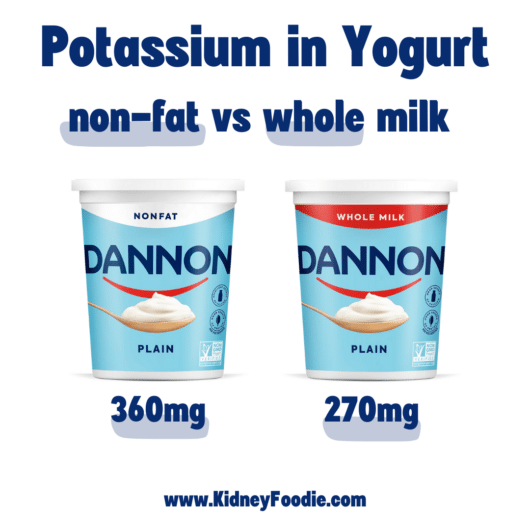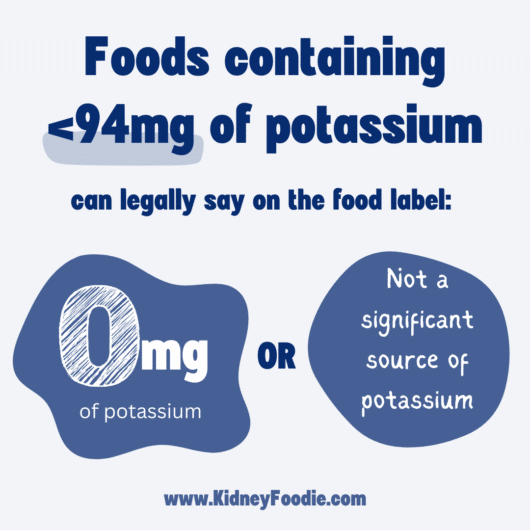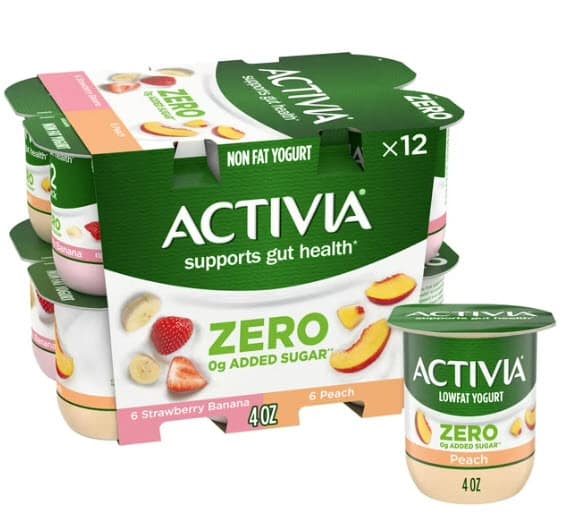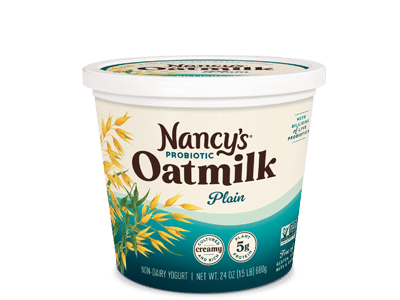Yogurt is a popular food item in many households. You can eat it on it’s own or use it as an ingredient in a lot of recipes. If you have chronic kidney disease, you may be wondering if you can continue to enjoy yogurt in your daily diet, and the answer to that is….probably, but with some caveats. Keep reading to see our top picks for kidney friendly yogurt and why they are a better choice for someone living with Chronic Kidney Disease.
This post may contain affiliate links through which we may earn a small commission to help keep this website free.
Skip the ads: Kidney Foodie Academy members can access ALL of the Kidney Foodie Grocery Shopping Guides ad-free by visiting this section of the library. Not a member? Learn more about Kidney Foodie Academy here.
Table of contents
Why is yogurt good for kidneys?
Before we talk about some of the concerns with yogurt, let’s start by talking about one of the major benefits of yogurt (aside from enjoying the taste!).
Yogurt contains probiotics. Maybe you’ve heard of probiotics, maybe you haven’t. Probiotics are living micro-organisms (such as bacteria) that produce health benefits when they are consumed. These micro-organisms set up shop in your gut and feed off of things like fiber (which is one reason it is important to get plenty of fiber in your diet). Probiotics have been associated with:
- Decreased odds of proteinuric kidney disease
- Decreased urea levels in CKD patients
- Lower levels of inflammation in patients with CKD
- Improved glucose metabolism in patients with diabetic kidney disease
There are more benefits to consuming probiotics beyond what I mentioned above, but hopefully you realize now that including yogurt and other fermented foods in your diet can be really beneficial.
Why might yogurt be bad for kidneys
Protein Content
Traditional dairy-based yogurts are high in protein. If you have Chronic Kidney Disease and are following a lower protein diet, the amount of protein in dairy based yogurts may be too much. If you are on dialysis and have higher protein requirements, the protein content of yogurt may not be an issue.
A typical serving of yogurt can contain anywhere from 8 to 20g of protein. Depending on your protein needs, 20g of protein could be almost 50% of your daily protein allowance for the day! Much like milk, plant based yogurts tend to be lower in protein and are easier to fit into the CKD Diet.
Low Phosphorus Yogurt
Many yogurts (both dairy and plant-based) contain phosphorus additives. Sometimes these are added to the food as a calcium supplement like you see below with the tricalcium phosphate in the Yoplait yogurt. Other times it may be added to improve the creaminess or texture of the yogurt.

Phosphorus additives are more easily digested by your body and can result in your body getting more phosphorus than it can handle. As kidney function goes down, your body is not able to remove extra phosphorus from the blood.
Too much phosphorus in the blood is associated with vascular calcification and other cardiovascular problems, so controlling phosphorus is important for keeping your cardiovascular system healthy.
While many yogurts contain additives, there are plenty out there that do not contain additives. It is important to read ingredient lists when shopping for a yogurt to ensure that you are not purchasing one with phosphorus additives.
Dairy-based yogurts also contain natural phosphorus. Although phosphorus additives are one of the primary drivers of excess phosphorus in the diet, dairy foods tend to be higher in phosphorus than plant-based yogurt alternatives. A 6 ounce container of coconut yogurt contains only 3.4mg of phosphorus while a 6 ounce container of plain whole milk yogurt contains 162mg of phosphorus.
Non-dairy yogurt alternatives with no phosphorus additives will be the lowest phosphorus yogurt.
Low Potassium Yogurt
Plant based yogurts will be lower in potassium than dairy based yogurts.
Since dairy based yogurts are made from milk, they will contain similar amounts of potassium as milk. In general, higher fat dairy based yogurts will be lower in potassium than lower fat dairy based yogurts, so if you prefer dairy based yogurt and need to be mindful of potassium, then focusing on full fat dairy will help you find a lower potassium yogurt.

If you read food labels, you may find some lower calorie yogurts that are lower in potassium. For example, a 50 calorie Activia yogurt reports having only 220mg of potassium per serving. However, it is important to note that the serving size is 33% smaller than a typical yogurt cup, so having less potassium would be expected.
The regular Activia yogurt cups are even lower in potassium with a reported 170mg per serving, however those yogurt cups are higher in sugar. This is a good example of why focusing too much on finding the lowest potassium food is not always the best strategy. The lowest potassium foods in a given food category will often be the ones highest in sugar. Despite being low in minerals, added sugar is not considered a kidney friendly food.
Many people with Chronic Kidney Disease do not necessarily need to limit their potassium intake. There are many other things that may be causing your high potassium levels besides food, and we offer a free mini-course on 5 Ways to Control Your Potassium Without Avoiding High Potassium Foods that you can register for here.
That being said, if you do need to limit your potassium intake, then choosing a plant based yogurt may be the best option. Some plant based yogurts report containing zero potassium, however it is important to understand that even if food labels list potassium as zero, they may still contain some potassium.

According to the FDA regulations, manufacturers are not required to list out the potassium content of a food if it contains less than 2% of the Recommended Daily Intake. The RDI for potassium is 4,700mg, so anything containing less than 94mg of potassium can omit it from the label or indicate that the food item is “not a significant source of potassium”. They can even list it as zero!
According to the USDA, coconut yogurt contains 46mg of potassium per 6oz serving (so not exactly “zero”, but still quite low).
Sodium in Yogurt
In general, we consider a food to be low in sodium if it contains less sodium than calories. Since yogurt is made from milk, which naturally contains sodium, most yogurts will contain some sodium.
However, the majority of yogurts do not contain added sodium. Less than 16% of the yogurts listed in the USDA Branded Food database in October 2023 contained added sodium and less than 8% of yogurts reported have more sodium than calories.
Yogurts that are more likely to have more sodium than calories are lower calorie yogurt, such as non fat yogurts. In general, we recommend avoiding products that are advertised as low fat, reduced fat, or fat free. Removing fat often removes flavor from foods, and manufacturers then try to make up for the lost flavor by adding more sodium or sugar to foods.
Additionally, people following a lower protein diet often need to eat more fat to help meet their calorie needs, so choosing lower fat foods is not recommended.
If you’re avoiding low-fat and nonfat yogurts, then it is VERY unlikely that you will come across a high sodium yogurt. The vast majority of yogurts are considered low sodium foods.
Calcium in Yogurt
Most dairy yogurts contain roughly 15% of the daily value of calcium. The calcium content of plant-based yogurt alternatives will vary depending on whether or not the manufacturer chooses to add calcium.
Some people with kidney disease need to be careful to avoid consuming too much calcium. If you are consuming a plant-based diet with limited dairy, it is unlikely that you are getting too much calcium and need to limit it.
If your doctor or dietitian has indicated that your calcium levels are too high, it is unlikely that a single serving of yogurt is what is causing it to be high. A dietitian would be able to do a thorough review of your diet, medications, and supplements to determine the true culprit of a high calcium.
If your doctor or dietitian has recommended that you limit your calcium intake, then review the nutrition labels of different yogurts and choose one with less calcium. Many yogurts contain calcium additives, so choosing a yogurt with no added calcium would be a better option. There are several plant based yogurt options listed below that contain very little calcium.
What type of yogurt is best for diabetes?
If you have kidney disease and diabetes, you will also want to focus on finding a yogurt that is higher in fat. Fat will help slow down the digestion of the carbohydrates and prevent spikes in blood sugar.
You will also want to compare brands to find one that is lower in sugar. Many people with diabetes prefer to purchase unsweetened yogurt so that they have control over adding their own non-caloric sweetener (such as stevia).
People with diabetes should also consider what they are eating their yogurt with. Good things to pair yogurt with would include high fiber fruit such as raspberries, strawberries, or blueberries. Fiber also help slow down the absorption of carbohydrates to prevent blood sugar spikes. You can also add in kidney friendly nuts for some additional fat and fiber.

Types of Yogurt for Kidney Disease (lowest protein first!)
Is coconut yogurt good for kidneys?
As long as they do not contain an phosphorus additives, coconut yogurts are typically a great option for people with chronic kidney disease because they are low in potassium and protein. Many coconut yogurts do contain phosphorus additives, so be sure to read ingredient lists to see if there are any ingredients with “PHOS” listed and choose ones without any phosphorus additives.
So Delicious Coconut Yogurt

- Calories: 130
- Protein: 0g
- Carbohydrate: 22g
- Fat: 4g
- Sodium: 30mg
- Phosphorus
Additives: None - Potassium: 0mg
- Calcium: 230mg
- Fiber: 2g
- Sugar: 15g
Culina Coconut Yogurt

- Calories: 220
- Protein: 2g
- Carbohydrate: 11g
- Fat: 17g
- Sodium: 25mg
- Phosphorus
Additives: None - Potassium: 180mg
- Calcium: 25mg
- Fiber: 0.5g
- Sugar: 9g
Is almond yogurt good for kidneys?
No, the vast majority of almond-based yogurts will contain phosphorus additives, which can be harmful for people with chronic kidney disease. Additionally, they tend to be higher in protein than some other plant based yogurts. Almond-based yogurts are NOT kidney friendly yogurts.
Is cashew yogurt good for kidneys?
As long as they do not contain an phosphorus additives, cashew-based yogurts can be a great option for people with chronic kidney disease because they are low in potassium and protein. Many cashew yogurts do contain phosphorus additives, so be sure to read ingredient lists to see if there are any ingredients with “PHOS” listed and choose ones without any phosphorus additives.
Forager Project Cashew Based Yogurt

- Calories: 140
- Protein: 3g
- Carbohydrate: 19g
- Fat: 6g
- Sodium: 10mg
- Phosphorus
Additives: None - Potassium: 2mg
- Calcium: 14mg
- Fiber: 1g
- Sugar: 12g
Is milk based yogurt good for CKD?
Dairy-based yogurts are typically higher in protein and potassium, which might raise concerns if you’re managing chronic kidney disease (CKD). However, they also offer some important benefits that make them worth considering in certain situations.
For one, dairy yogurts are a reliable source of calcium—a nutrient many people with CKD don’t get enough of, especially if they’ve cut back on dairy or fortified plant-based products. Unlike many plant-based yogurts, dairy yogurts naturally contain calcium and are easier to find in a variety of styles and flavors.
While it’s true that animal proteins are generally more acid-forming, milk-based products like yogurt are less acidic compared to meats, making them a gentler animal protein option for kidney health. And even though the protein content is higher, a small portion (about ½ cup or a smaller single-serve container) can still provide the benefit of probiotics with a manageable protein load.
If you’re focusing on increasing your intake of plant-based proteins, that’s still a smart move—but dairy yogurt can make sense as an exception, especially when you’re looking for a convenient source of calcium and probiotics.
That said, there are a few things to watch for:
- Portion size matters. Stick to about ½ cup to keep protein and potassium levels in check.
- Avoid Greek Style. These will be higher in protein. Choose a regular yogurt.
- Check for added sugars. Some lower-protein dairy yogurts (like blended or drinkable styles) may be high in sugar, which is especially important for people with diabetes.
- Look for phosphorus additives. Read the ingredient list and try to avoid products with added phosphates.
If you’re unsure how to fit dairy yogurt into your routine, it’s worth talking to a renal dietitian who can help tailor your choices to your specific needs.
Is Activia Yogurt good for kidneys?
Activia yogurt can be a good choice for people with kidney disease who are looking for a readily available yogurt brand that comes in smaller portion sizes, while still containing a good amount of calcium. They even make versions that contain no added sugars like the one listed below.
Activia Zero Sugar

- Calories: 50
- Protein: 4g
- Carbohydrate: 9g
- Fat: 0g
- Sodium: 65mg
- Phosphorus
Additives: None - Potassium: 220mg
- Calcium: 170mg
- Fiber: 1g
- Sugar: 5g
Is Oat yogurt good for CKD?
As long as they do not contain an phosphorus additives, oat-based yogurts can be a great option for people with chronic kidney disease because they are also low in potassium and protein. Many oat-based yogurts do contain phosphorus additives, so be sure to read ingredient lists to see if there are any ingredients with “PHOS” listed and choose ones without any phosphorus additives. We were only able to find one brand that did not list any phosphorus additives.
Nancy’s Oatmilk Yogurt

- Calories: 120
- Protein: 5g
- Carbohydrate: 11g
- Fat: 6g
- Sodium: 55mg
- Phosphorus
Additives: None - Potassium: 40mg
- Calcium: 150mg
- Fiber: 3g
- Sugar: 0g
Is Greek yogurt good for CKD?
Greek yogurt is known for being the highest protein yogurt, which means it is not a kidney friendly yogurt for people with CKD and not on dialysis. We recommend that you avoid this kind of yogurt (including the plant based Greek-style yogurt!) if you are following a lower protein diet.
If you are on dialysis, then Greek yogurt may be a good option. Talk to your dietitian about your calcium and potassium needs.
Low Potassium Yogurt Brands
Below is a list of the yogurt brands we found that contain no phosphorus additives, along with their potassium content. Plant-based yogurts tend to be the lowest in potassium (although not always!).
Many people with Chronic Kidney Disease do not necessarily need to limit their potassium intake. There are many other things that may be causing your high potassium levels besides food, and we offer a free mini-course on 5 Ways to Control Your Potassium Without Avoiding High Potassium Foods that you can register for here.
Summary
Yogurt can be a great addition to a kidney friendly diet so long as you find one with no phosphorus additives and the right amount of protein that you need.
Need more help with your diet? Consider booking a one-on-one appointment with a Board Certified Kidney Dietitian. Most insurance companies will cover the cost to work with a dietitian.

